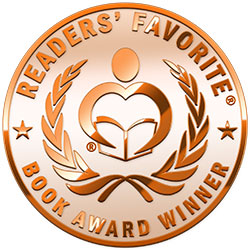
 This author participates in the Readers' Favorite Free Book Program, which is open to all readers and is completely free. The author will provide you with a free copy of their book in exchange for an honest review. You and the author will discuss what sites you will post your review to and what kind of copy of the book you would like to receive (eBook, PDF, Word, paperback, etc.). To begin, click the purple email icon to send this author a private email.
This author participates in the Readers' Favorite Free Book Program, which is open to all readers and is completely free. The author will provide you with a free copy of their book in exchange for an honest review. You and the author will discuss what sites you will post your review to and what kind of copy of the book you would like to receive (eBook, PDF, Word, paperback, etc.). To begin, click the purple email icon to send this author a private email.
![]() This author participates in the Readers' Favorite Book Review Exchange Program, which is open to all authors and is completely free. Simply put, you agree to provide an honest review an author's book in exchange for the author doing the same for you. What sites your reviews are posted on (B&N, Amazon, etc.) and whether you send digital (eBook, PDF, Word, etc.) or hard copies of your books to each other for review is up to you. To begin, click the purple email icon to send this author a private email, and be sure to describe your book or include a link to your Readers' Favorite review page or Amazon page.
This author participates in the Readers' Favorite Book Review Exchange Program, which is open to all authors and is completely free. Simply put, you agree to provide an honest review an author's book in exchange for the author doing the same for you. What sites your reviews are posted on (B&N, Amazon, etc.) and whether you send digital (eBook, PDF, Word, etc.) or hard copies of your books to each other for review is up to you. To begin, click the purple email icon to send this author a private email, and be sure to describe your book or include a link to your Readers' Favorite review page or Amazon page.
![]() This author participates in the Readers' Favorite Book Donation Program, which was created to help nonprofit and charitable organizations (schools, libraries, convalescent homes, soldier donation programs, etc.) by providing them with free books and to help authors garner more exposure for their work. This author is willing to donate free copies of their book in exchange for reviews (if circumstances allow) and the knowledge that their book is being read and enjoyed. To begin, click the purple email icon to send this author a private email. Be sure to tell the author who you are, what organization you are with, how many books you need, how they will be used, and the number of reviews, if any, you would be able to provide.
This author participates in the Readers' Favorite Book Donation Program, which was created to help nonprofit and charitable organizations (schools, libraries, convalescent homes, soldier donation programs, etc.) by providing them with free books and to help authors garner more exposure for their work. This author is willing to donate free copies of their book in exchange for reviews (if circumstances allow) and the knowledge that their book is being read and enjoyed. To begin, click the purple email icon to send this author a private email. Be sure to tell the author who you are, what organization you are with, how many books you need, how they will be used, and the number of reviews, if any, you would be able to provide.

Reviewed by Ayrial King for Readers' Favorite
An extremist ecological group is set on destroying a field of genetically-modified corn. A rising against and for building a tourist attraction in the forest reserve of a quaint but seemingly-backward little town. A seemingly endless loop of ethnic warfare between gypsies and blacks. This is what Jesus walks into in João Cerqueira’s novel, Jesus and Magdalene. He joins Magdalene, an environmental activist with high hopes for a better world, in navigating the currents of the modern world as it grapples with issues he tried to solve long ago. Their success ultimately hinges on people’s willingness to change their minds, perspectives, or loyalties, and embrace the possibilities – and consequences – of the unknown.
João Cerqueira really took the phrase “What Would Jesus Do?” to heart when he wrote Jesus and Magdalene, a recreation of their journey together across unknown land (to him at least) to combat the world’s woes. Magdalene, a proponent of an ecological utopia, travels with Jesus to show him how humans have ruined everything (the environment and themselves) with the hope of reeducating them on how to come back from the brink. Jesus, knowing firsthand the ways and wiles of human nature, joins her as her mostly-silent companion – oftentimes being her sounding board and voice of reason. They and Cerqueira shed light on how the modern world is not so different from the world Jesus knew. The issues of today are just as old if not older than the issues of then – just dressed in different clothes.